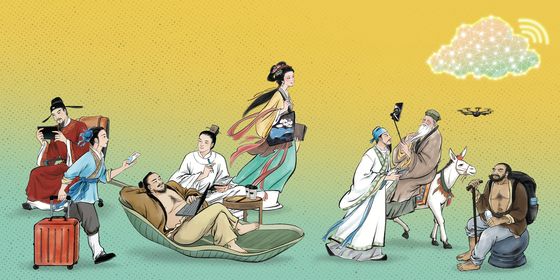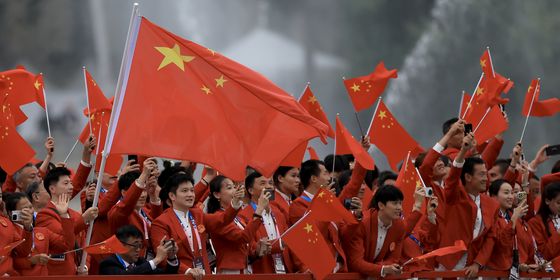The origin of “后浪,” the newest inspirational buzzword for Chinese youths
“A nation’s most beautiful scenery is its youth. Kind, brave, selfless, fearless…Surge ahead, rear waves!” Chinese actor He Bing declared in the viral video “Rear Waves,” which was released by video-sharing platform Bilibili for China’s Youth Day on May 4.
The inspirational speech struck a chord with the so-called “post-80s” and “post-90s” generations of Chinese, who once got a bad rap from their elders for being rebellious and spoiled. Impressive footage featuring youths skydiving and winning e-sports championships also appealed to millennials’ self-image as an individualistic and dynamic group that will shape the future of China.
The buzzword popularized by the video, 后浪 (hòulàng, rear waves), stems from an ancient Chinese saying, “As the rear waves of the Yangtze River drive on the waves in front, so the new replaces the old.”
The term is often used to compliment outstanding youths: The “students wave (学生后浪 xuéshēng hòulàng)” refers to hardworking pupils who inspire others to achieve excellence, whereas the “workplace wave (职场后浪 zhíchǎng hòulàng)” refers to the young employees who have become the backbone of many Chinese corporations.
Vigorous young people aside, the buzzword can also be used for novel concepts and institutions. For instance, the “startup wave (创业后浪 chuàngyè hòulàng)” refers to burgeoning new businesses, and a “rear wave brand (后浪品牌 hòulàng pǐnpái)” is one that embraces innovation boldly.
Marketers and influencers have picked up on houlang as an inspirational slogan. As the government began to promote street vendors to buoy China’s post-Covid-19 economy, an eye-catching WeChat article titled “Set Up a Stall, Rising Waves!” urged young people to jump on the bandwagon.
However, some cynics dismiss the Bilibili video as a marketing gimmick for the platform. They lament that these so-called inspirational buzzwords have little relevance to the struggles of today’s youngsters. “Only those with financial means can have dreams. We are more of a ‘leek wave (韭浪 jiǔlàng)’ than a rear wave,” commented one user on Weibo.
Jiulang, a compound of houlang and “割韭菜 (gē jiǔcài, harvesting leeks),” is a new slang term meant to taunt naive youths exploited to generate profits for higher powers. “割韭菜” was originally a metaphor from the stock market, where seasoned investors persuade inexperienced new players to buy shares which inflates the price, then sell their own shares for a larger return.
In nature, a new batch of leeks will grow where an old batch is cut. While the rolling waters of the Yangtze symbolizes continued progress, ge jiucai is just the opposite—expressing the despair that there will always be a fresh wave of young people ready to be utilized by the system.
That said, the term is usually used in a tongue-in-cheek way. When fans buy a defective product endorsed by a celebrity, they might cry, “As a longtime fan, I can’t believe I was harvested by my favorite idol! (粉了这么久,居然被喜欢的明星割韭菜了!Fěn le zhème jiǔ, jūrán bèi xǐhuan de míngxīng gē jiǔcài le!)” Somebody who clicks on a WeChat article teaching financial success, and finds it to be an ad for an online training course costing thousands of yuan, might sigh, “I was expecting to make a fortune, but ended getting cut like a leek (本来想年薪百万,结果被当韭菜割了。Běnlái xiǎng niánxīn bǎiwàn, jiéguǒ bèi dāng jiǔcài gē le.)”
Whether they identify with waves or leeks, young people have the following things in common: They’re fresh, full of life, and ready to make their mark on the world. So go forth and take the wave—just be sure not to end up on somebody’s dinner plate.
Riding the Wave is a story from our issue, “High Steaks.” To read the entire issue, become a subscriber and receive the full magazine.












